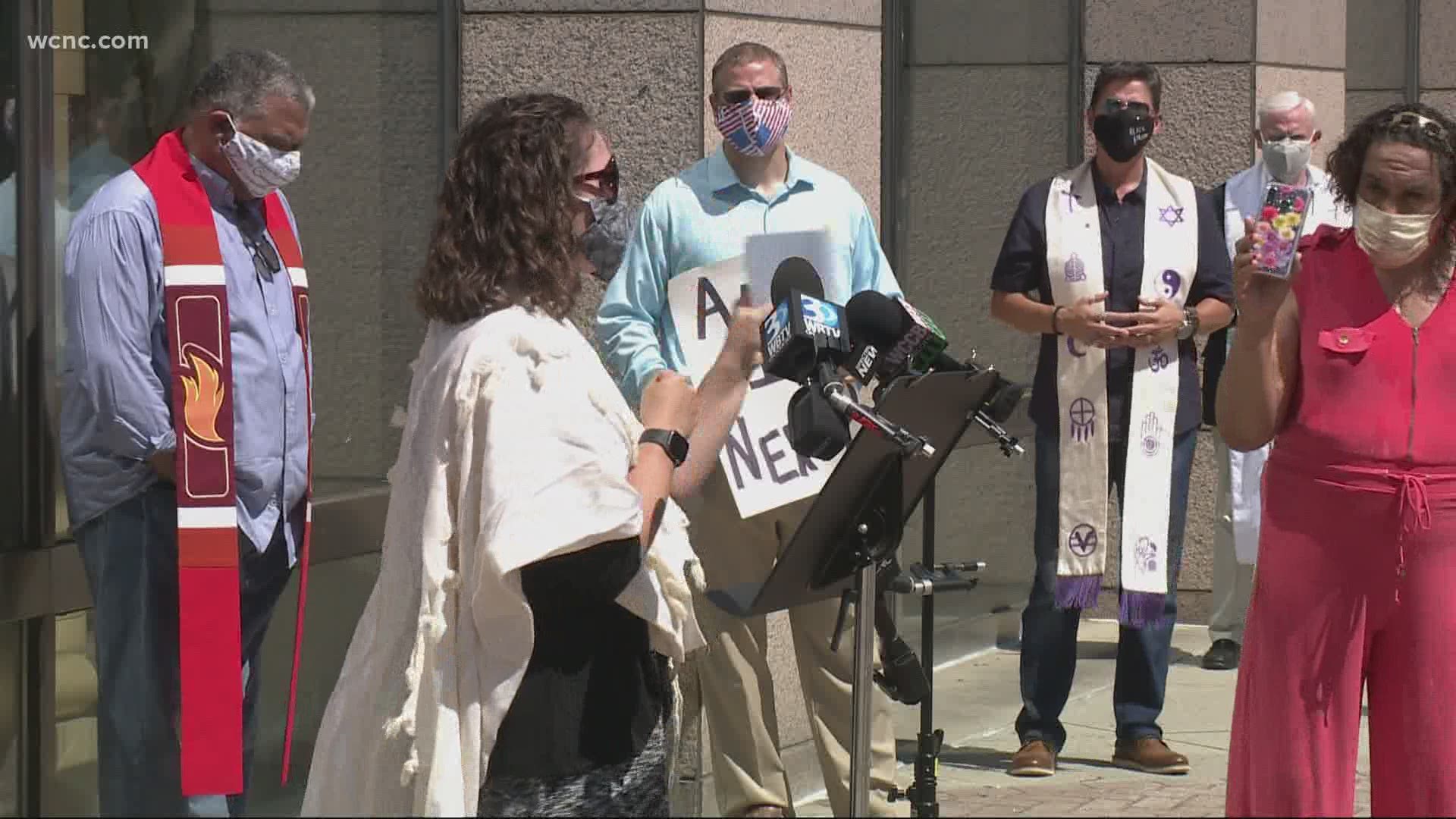CHARLOTTE, N.C. — Weeks after working with city officials to keep the peace on the streets during Charlotte’s protests following the death of George Floyd, a growing group of Charlotte-area clergy is calling for major changes in local policing.
“Last month, Mayor Vi Lyles and City Manager Marcus Jones asked us to be on the streets to help keep protests peaceful, and we were out every night,” said Rev. John Cleghorn. “As we walked, we listened to our neighbors as they expressed their pain over police brutality in the wake of George Floyd’s killing.”
“The mayor and city manager agreed then to work with us on local police reform,” Rev. Veronica Cannon said. “Unfortunately, in the weeks since then, our concern about what public safety looks like in Charlotte have only deepened.”
So Monday, members of the Charlotte Clergy Coalition for Justice met on the steps of the Mecklenburg County Government Center in Uptown, announcing a list of “Ethical Policing Demands.” There are 16 demands in total, focusing on a range of issues, including demilitarizing CMPD to adding mental health supports for front line officers.
They’re also demanding that City council publicly acknowledge, ”the patent inequity of the clearly established law test which stipulates that an officer, in order to be held accountable, must knowingly be violating a written law at the time the violation happens and there must be a precedent in other cases, exactly matching the violation he or she is at the time committing.”
Demands also include defunding and abolishing the use of tear gas, pepper balls, pepper spray and all other chemical agents by CMPD.
“City council and city manager will redirect all money withdrawn from CMPD which comes from use and maintenance of military weapons, as well as use and maintenance of chemical agents to social justice causes which demonstrably aide social determinants of health and other causes which create economic, educational and social equity between our neighbors both black and white,” says the coalition.
The group also wants the city council to add mental health supports, including mandatory mental health support for line officers.
“First, we want to see independent psychological professionals added to the CMPD full-time employees and approved by the safe community committee of the city council to ride along on all domestic and mental health calls,” the group said.
They say they’d also like to see city council implement swift and stringent fines against people who fraudulently make emergency calls to police about black people.
Tactics, clergy members say they’ve experienced first-hand. First in 2016, when they joined protestors marching after the death of Keith Lamont Scott and then just last month when clergy members were among protestors cornered and tear-gassed by police in Uptown Charlotte.
“Wearing his clergy shoal, asking a police officer when he heard the order to disperse, asking him where would you have us go?” said Rev Christy Snow, Spiritual Director of the Carolina Center For Spiritual Awakening.
The coalition says they won’t stop until their demands are met.
“Imagine what it looks like with 4000 churches siding on the side of justice and making their message known in voting,” says Reverend Glencie Rhederick, Associate minister at First Baptist Church West.
CMPD released the following statement:
Chief Jennings has made it clear that community collaboration is a priority for the Charlotte-Mecklenburg Police Department. That will require all of us to come together and have meaningful dialogue.
The CMPD is eager to engage with anyone from the community who wants to meet and discuss responsible reform. The community provides the CMPD the authority to police and they should have input concerning how they want to be served.
The concerns focus on a range of issues, including:
- The absence of public involvement in the selection of Police Chief Johnny Jennings, following Kerr Putney’s retirement.
- Reversing the growing use of military tactics, equipment and training to handle local law enforcement.
- An immediate review of granting qualified immunity to officers involved in police shootings.
- And the need to redirect funding away from the storage and use of chemical agents for use on citizens to more proactive programs that address documented economic, health and social disparities affecting people of color and the poor. Alternatives include violence prevention interruption and adding mental health professionals to ride along with officers on domestic abuse and mental health calls.

